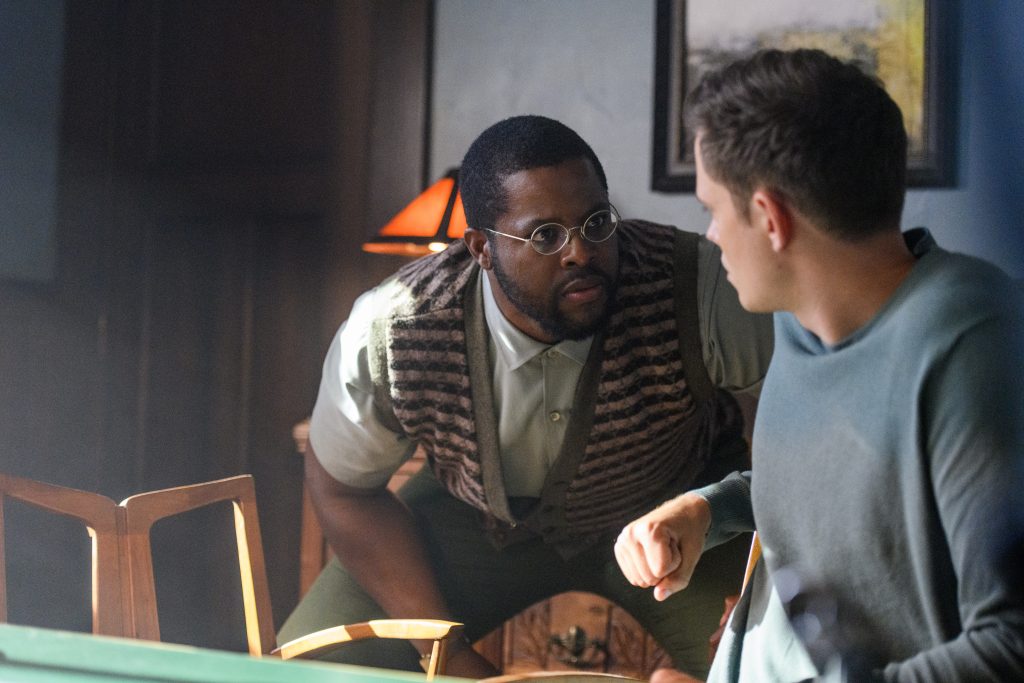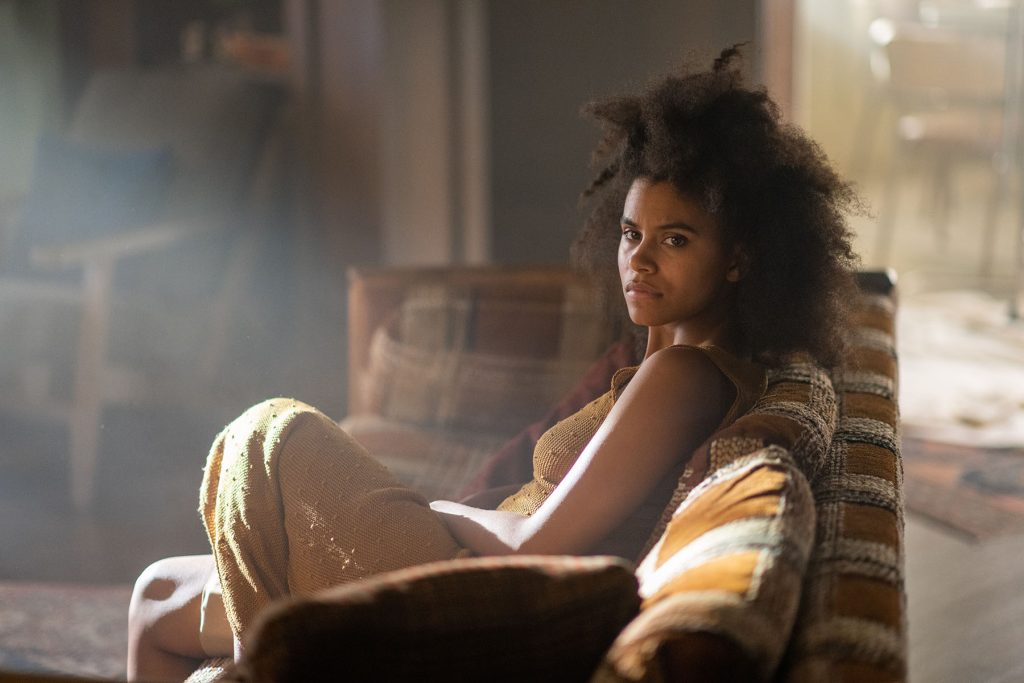February 25, 2022
by Carla Hay

Directed by Damien Power
Culture Representation: Taking place in California, the dramatic film “No Exit” features a racially diverse group of characters (white, Asian, African American and Latino) representing the working-class and middle-class.
Culture Clash: During a blizzard that has caused road blockages and closures, a young woman finds herself trapped in a visitor center shelter with four strangers, when she finds out that a van owned by one of the strangers has a kidnapped girl inside.
Culture Audience: “No Exit” will appeal mainly to people who like any suspense thriller, no matter how idiotic the plot gets.

“No Exit” is an apt description for how this mystery thriller gets trapped in its own stupidity. It starts off suspenseful and then it takes a steep nosedive into illogical nonsense. There’s a long stretch of the film, which takes place during a snow blizzard, where the criminal element in the movie frantically struggles to get access to a car to make an escape. Meanwhile, the filmmakers are expecting viewers to forget that the entire point of the movie is that all the movie’s characters who are trapped in the blizzard know that the blizzard has caused the roads to blocked, with police guarding the roadblocks, and an escape isn’t really possible.
It’s not spoiler information to reveal that “No Exit” is about a serious crime that’s been committed, and whoever has committed this crime is in a small group of people at a visitor center shelter during this blizzard. The movie’s protagonist decides she’s going to be a one-woman police force to solve the mystery and get justice for this crime. Directed by Damien Power, “No Exit” was written by Andrew Barrer and Gabriel Ferrari. The movie’s screenplay is based on Taylor Adams’ 2017 novel of the same name. Even though some of the cast members give good performances, the entire movie has a flawed premise that’s poorly executed in the last half of the film.
“No Exit” begins with protagonist Darby (played by Havana Rose Liu) looking bored and emotionally disconnected in a drug rehab center somewhere in California. (“No Exit” was actually filmed in New Zealand.) Darby is in her early 20s, and she’s in court-ordered rehab for a crime that is not mentioned in the movie. Through conversations in the movie, it’s revealed that Darby has been in rehab or tried to get clean and sober seven times already in her life.
During a rehab group meeting, Darby is told that she has an emergency phone call. When she takes the call, she finds out from her uncle Joe (voiced by David Chen) that her widowed mother has had a brain aneurysm and is in a hospital in Utah. Darby’s mother is scheduled to get a brain operation, but it’s a risky procedure. The medical diagnosis is that Darby’s mother might not have much longer to live.
Darby is estranged from the two family members who know her the best: her mother and Darby’s older sister Devon. And despite Darby’s pleas to make a phone call for this emergency, she’s denied this request by her rehab group leader Dr. Bill Fletcher (played by James Gaylyn) because it’s the rehab center’s rule that patients can’t make outgoing phone calls. Any incoming phone call for a patient has to be an emergency, and the call is monitored by the rehab center staff.
But this obstacle isn’t enough to stop Darby. She borrows a cell phone that was snuck in by another rehab patient, whose name is Jade (played by Nomi Cohen). Jade and Darby don’t like each other, but Jade reluctantly agrees to let Darby use her phone because Darby threatens to tell the rehab officials that Jade broke the rules by sneaking in a cell phone.
Darby uses the phone to call Devon (played by Lisa Zhang), who tells Darby in no uncertain terms that she’s doesn’t want Darby to contact her or visit their mother. Darby says she’s going to find a way to visit. Devon abruptly and angrily tells Darby, “I don’t have time for your bullshit. Don’t call me back!”
This rejection still doesn’t stop Darby. In broad daylight, she sneaks out of the rehab center to steal the car of an orderly named Mike (played by Nick Davies), nicknamed Mikey, who seemed to take pleasure in denying Darby any phone privileges. Darby has also stolen Jade’s phone. Darby’s plan is to take the stolen car and drive to Utah to see her mother. But this trip comes at a very bad time because she isn’t on the road for long when a blizzard hits while she’s in California’s Sierra Nevada Mountains.
One of the first things that Darby found in Mike’s car was a small packet of cocaine hidden in the driver’s window shade. The movie plays guessing games with viewers over whether or not Darby will relapse by using this cocaine. Darby describes her drug addiction as being willing to do any drug that comes her way.
During this blizzard, Darby gets text messages from Devon that say, “Mom doesn’t want you here.” “You’ll only make it worse.” “Don’t come.” Darby is still undeterred. She pulls over on a road to get some sleep, and she has a nightmare that people outside the car are trying to get her. She wakes up to a state trooper named Ron Hill (played by Benedict Wall), who finds out why she’s traveling during a blizzard.
He tells Darby that the only road leading to Utah is closed, and she has one of two choices: She can either reverse and go back to where she came from, or she can stay at a visitor’s center a few hundred yards away. The center is being used as a temporary shelter during the storm. The trooper also mentions that some other travelers are already at the shelter.
Darby decides to go to the shelter. Inside, there are four other strangers. Ed (played by Dennis Haysbert) is a former U.S. Marine who served in Operation Desert Storm. Ed’s wife is Sandi (played by Dale Dickey), a former nurse who met Ed when she was working at a Veterans Administration hospital. This middle-aged couple is traveling to Reno, Nevada, to do some gambling. Rose and Ed are immediately friendly and welcoming to Darby.
The other two people in the shelter are men in their 20s: Lars (played by David Rysdahl) is introverted and eccentric. He’s the type of person who talks to himself out loud when other people are around. Ash (played by Danny Ramirez) is talkative and a little flirtatious with Darby. He can also be crude and insensitive. Darby and the other four people in the shelter make small talk as they get to know each other.
No one in the shelter can get any cell phone service or WiFi service because of the blizzard and because of where they are in this remote mountain area. Still, Darby occasionally goes outside the shelter near the parking lot to see if her phone can pick up a signal. It’s during one of her trips outdoors when Darby is alarmed to see a hand and noises coming from a van parked outside.
She goes inside the van and finds a kidnapped girl, who’s about 9 or 10 years old. The girl is bound and gagged and desperate to escape. However, Darby knows that she can’t use her phone to get help, so she tells the girl that she will help her, but she has to be patient. Darby later finds out that the girl’s name is Jay (played by Mila Harris), as well as more things about who Jay is and why she was kidnapped.
Feeling trapped and helpless, Darby goes back into the shelter and acts like nothing is wrong, in order to figure out who’s the driver of the van. Before she went back into the shelter, Darby noticed that the van has Nevada license plates. The rest of the movie is a ridiculous cat-and-mouse game where Darby tries to solve the mystery and get help for the kidnapped girl without getting caught by whoever is responsible for the abduction. It’s this second half of the movie that unveils some twists and turns, with each becoming more ludicrous as times goes on.
“No Exit” has so many bad decisions, not just with the characters, but also with how the filmmakers staged everything to look so phony in the latter half of the movie. As the flawed hero Darby, Liu does her best to try to make everything in this moronic film believable, but the movie completely buries any credibility with some of the stupid plot twists, just like the blizzard in this movie buries things in the snow. The rest of the cast members are fairly solid in their roles, except for Ramirez, whose performance becomes campier as the story devolves into an irredeemable mess. You know a movie is bad when it’s called “No Exit,” but everything that happens in the last half of the movie is as if the reason for this movie’s title doesn’t exist.
Hulu premiered “No Exit” on February 25, 2022.


